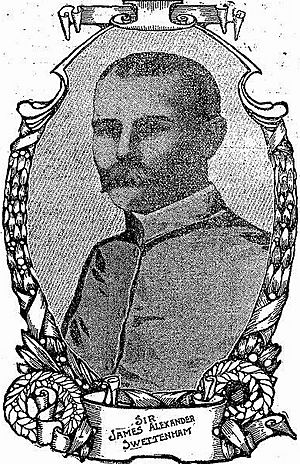Alexander Swettenham facts for kids
Quick facts for kids
Sir Alexander Swettenham
|
|
|---|---|
 |
|
| Governor of Jamaica | |
| In office 30 September 1904 – 1907 |
|
| Monarch | Edward VII |
| Preceded by | Augustus Hemming |
| Succeeded by | Sydney Haldane Olivier |
| 41st Governor of British Guiana | |
| In office 3 July 1901 – 26 September 1904 |
|
| Monarch | Edward VII |
| Preceded by | Walter Joseph Sendall |
| Succeeded by | Frederick Mitchell Hodgson |
| Acting Governor of the Straits Settlements | |
| In office 7 December 1899 – 5 November 1901 |
|
| Monarch | Queen Victoria Edward VII |
| Preceded by | Sir Charles Mitchell |
| Succeeded by | Sir Frank Swettenham |
| 7th Colonial Secretary, Straits Settlements | |
| In office 11 February 1895 – 7 December 1899 |
|
| Monarch | Queen Victoria |
| Governor | Charles Mitchell |
| Preceded by | William Edward Maxwell |
| Succeeded by | Walter Egerton (acting) Sir Charles Walter Sneyd Kynnersley (acting) |
| 20th Accountant General and Controller of Revenue | |
| In office 31 July 1891 – 10 June 1895 |
|
| Preceded by | George Thomas Michael O'Brien |
| Succeeded by | William Thomas Taylor |
| Personal details | |
| Born |
James Alexander Swettenham
1846 Belper, Derbyshire, England |
| Died | 19 April 1933 (aged 86–87) La Colline, Switzerland |
| Resting place | Vevey, Switzerland |
| Spouse |
Mary Emily née Copeland
(m. 1905) |
| Parent |
|
| Alma mater | Clare College, Cambridge |
| Occupation | Colonial administrator |
Sir James Alexander Swettenham (1846 – 19 April 1933) was an important British leader. He served as the Governor of British Guiana from 1901 to 1904. Later, he became the Governor of Jamaica from 1904 to 1907.
Contents
Early Life and Family
Growing Up in England
Alexander Swettenham was born in 1846. His father, James Oldham Swettenham, was a lawyer. Alexander grew up near Belper, in Derbyshire, England. He later studied at Clare College, Cambridge, a famous university.
His Family Life
Alexander had a younger brother named Frank. Frank also worked as a colonial administrator, like Alexander. Alexander married Mary Emily Copeland in 1905. Her family was known for making Wedgwood pottery. Alexander and Mary did not have any children.
A Career in Colonial Administration
Early Roles in Asia
Alexander started his career in 1868. He joined the Ceylon Civil Service. Ceylon is now known as Sri Lanka. He worked there until 1883. In 1884, he became the Receiver-General for Cyprus. This job involved managing money.
He returned to Ceylon in 1891. There, he became the Accountant General. He held this important financial role until 1895. After that, Alexander moved to Singapore. He served as the Colonial Secretary there. This was a very senior position. He even became acting Governor for a short time. This happened when the previous Governor, Sir Charles Mitchell, passed away. Alexander then handed the role over to his brother Frank in 1901.
Governor of British Guiana
From 1901 to 1904, Alexander served as the Governor of British Guiana. This country is now known as Guyana. As Governor, he was the main leader. He was responsible for managing the colony.
Governor of Jamaica and the Kingston Incident
In 1904, Alexander became the Governor of Jamaica. This was another important leadership role. In 1907, a very strong earthquake hit the island. It caused a lot of damage. Alexander was in charge of helping the island recover.
During this time, American marines arrived to help. They were led by Rear-Admiral Charles H. Davis Jr. However, Alexander felt he had the situation under control. He asked the American forces to leave. The Americans were offended by this request. This disagreement became known as the Kingston Incident. Because of this event, Alexander decided to resign from his position.
Later Life and Recognition
His Final Years
Alexander passed away in 1933. He died in a clinic in La Colline, Switzerland. He was buried in Vevey, Switzerland.
Awards and Honours
Alexander received special recognition for his work. In 1892, he was awarded the Companion of the Order of St Michael and St George (CMG). He was later knighted in 1898. This meant he could use the title "Sir." He became a Knight Commander of the Order of St Michael and St George (KCMG).

